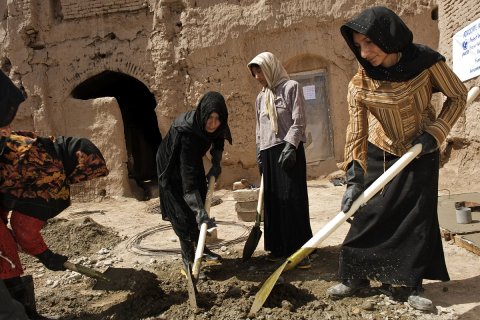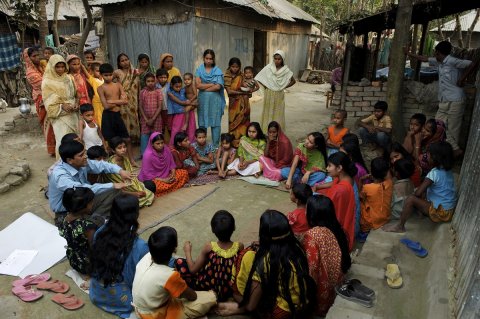World Toilet Day: A sanitation revolution in South Asia
Recognising how fundamental toilets are to sustaining children’s health, social and economic development, UNICEF and many governments, donors and partners started to advocate for and prioritise sanitation. And in 2013, the UN unanimously declared 19 November as World Toilet Day.
As we approach World Toilet Day this year, it’s easy to be skeptical and wonder why we have or need such days. Does the humble toilet really deserve such recognition? Absolutely. We know that sanitation is essential to health and that children under five are the most vulnerable to the effects of insufficient sanitation.
Every day, diarrhoea resulting from inadequate sanitation, water and unsafe hygiene practices kills around 1,400 children under the age of five globally [UNICEF, The State of the World's Children, 2016]. This means that every second minute of every day a child dies because of lack of sanitation.
Sanitation is crucial for child survival

Diarrhoea is also closely linked to under-nutrition, a condition that is associated with more than half of all under-five deaths; and undernourished children, in turn, have compromised immune systems and are at a higher risk for developing pneumonia – which kills more children than any other disease.
This chain reaction illustrates that sanitation is fundamental for child survival especially when you consider that, of the approximately 100 million children born in developing countries each year, almost half will live in households without access to improved sanitation facilities.
As someone who has worked in the Water, Sanitation and Hygiene (WASH) sector for the past three decades it’s amazing for me to see the changes – even in how we communicate about sanitation. In the past we “sanitised sanitation”. This meant using only polite terms which often meant nothing to our audiences. I was once asked to remove the word 'toilet' from a speech in case it might be offensive.
Today, mainly thanks to initiatives like the International Year of Sanitation, World Toilet Day and some amazing and innovative advocacy campaigns, sanitation, open defecation, toilets and latrines are spoken about freely and it’s really making a difference to the lives of people in South Asia.
Huge progress being made to stop open defecation in South Asia
On the surface it looks like South Asia has a very high mountain to climb to solve its sanitation problem as 558 million people in the region practise open defecation, representing 64% of the global burden [WHO/UNICEF Joint Monitoring Report on Water and Sanitation]. However, over the last decade we have seen the greatest increase in the use of toilets than in any time in the history of South Asia, over 240 million people starting using toilets and stopping open defecation.
But more importantly the momentum for change has begun and I believe that within the coming decade a new social norm will be established across the region and the old practice of open defecation will be eliminated for good.
This sanitation revolution is spreading in different ways across the continent. Just last week, Afghanistan declared its first open defecation free district in Nili District in Daikundi province. About 18% of the rural population of Afghanistan defecates in the open and this greatly contributes to the death of 9,500 children under five who die of diarrhoea each year, as well as the 41% of children in Afghanistan who are stunted. All households in the 97 communities of Nili district now have toilets and open defecation is a thing of the past. Many more districts in Afghanistan are also on their way to becoming open defecation free.
In India, the Swachh Bharat Mission or the Clean India Campaign led by the Prime Minister is changing lives throughout the country. To date, over 49 million households have been reached and 267,000 villages have been declared open defecation free.
The importance of this sanitation revolution in India is immense as it is estimated that almost 117,000 children die each year due to diarrhoea. That is more than 13 children each hour of each day and in India 39% of children are stunted.
Better sanitation means better economies

But the Swachh Bharat Mission (Gramin) is also highly cost-beneficial from both a financial and an economic perspective. Studies have shown that in terms of cost-benefit ratio, the benefits exceed costs by an average of 4.3 times. This means that for every 1 R invested there is a gain to the household of 4.3 Rs. The aim of the SBM is to achieve an open defecation free India by November 2019.
In Bangladesh, one of the key responses to the displaced Rohingya influx is to provide latrines to the 850,000 people currently in the camps. While this is important from a health perspective and vital for the prevention of cholera and acute watery diarrhoea (AWD), they are also important for ensuring dignity and privacy, especially for women and girls.
Over the past few weeks, more than 20,000 latrines have been built which provide an important level of self-dignity to the displaced population.
Other examples from across the region are equally as impressive, such as the Pakistan Approach to Total Sanitation (PATS) and the accelerated open defecation free district campaigns and total sanitation programme in Nepal. These clearly demonstrate that there is a sanitation revolution happening in South Asia.
Total elimination of open defecation needs commitment from all parties
In South Asia, we are well on our way to achieving our goal of eliminating open defecation. But we also realise that we still have a huge task ahead of us. Across the region, all governments and partners have committed to eliminating the practice of open defecation – the most harmful and undignified behaviour that over 558 million people in the region still practice.
This can be done; country by country, community by community with everyone playing their part in the sanitation revolution; so that our children can survive, so that countless women do not have to suffer constant and recurring indignity, so that our girls and boys can thrive at school and at home.
The first step in this might be to openly talk about sanitation on World Toilet Day.